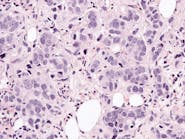New research involving 28 National Cancer Institute (NCI)-Designated Cancer Centers, including Siteman Cancer Center at Barnes-Jewish Hospital and Washington University School of Medicine in St. Louis, indicates it’s both possible and helpful to get cancer patients who smoke into evidence-based tobacco-treatment programs as part of their cancer care.
Studying data involving almost 700,000 patients at the 28 NCI-Designated Cancer Centers, a team of researchers found that it’s beneficial to integrate tobacco treatment into cancer centers’ routine cancer care.
The findings are published Dec. 6 in the Journal of Clinical Oncology.
After screening cancer patients to learn whether they smoke, the researchers identified more than 44,000 smokers at the cancer centers. The researchers discovered that if they could get those patients into evidence-based therapy — such as nicotine replacement, counseling or both — they could help nearly one in five kick the habit and, in doing so, improve the effectiveness of their cancer therapy and boost the patients’ cancer survival rates. Quitting smoking doubles the survival rate for cancer patients and lowers the risk of cancer recurrence, no matter the stage of the cancer.
A national effort called the Cancer Center Cessation Initiative was established as part of the Cancer Moonshot project. In this new study, researchers successfully screened 96% of cancer patients at the 28 NCI-Designated centers participating in the initiative.
There’s still a long way to go. Overall, only about one in seven (15%) patients ends up receiving treatment to curtail tobacco use. But among those who did, almost one in five (18%) succeeded in quitting or severely curtailing tobacco use.





